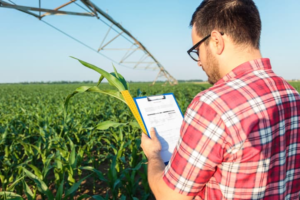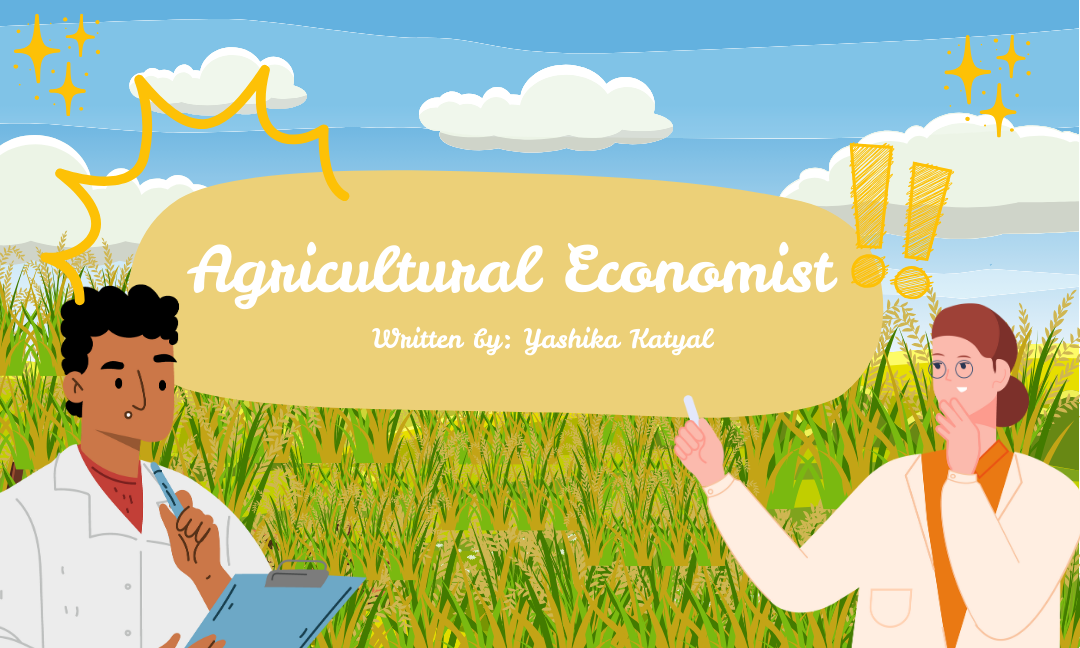The Unexpected Career That Feeds Canada—and Could Change the World
Written by: Yashika Katyal
Edited by: Alishba Khursheed
Designed by: Suhana Shaik
Published by: Eleanor Jeavons
Not Your Typical Desk Job
When you hear the word “agriculture,” you might think of tractors, muddy boots, or someone working on a farm. But what if I told you there’s a job in agriculture where you can work in an office, influence government decisions, use data to solve global problems like hunger—and still be part of something that affects every single person on the planet? Welcome to the world of agricultural economics, where farming meets finance, and spreadsheets save the future.
What Do Agricultural Economists Actually Do?
Agricultural economists are like the brains behind the scenes of the food world. They figure out how to feed people in smarter, more sustainable ways. That might mean calculating how climate change will affect crop prices, studying why food costs are rising, or helping farmers make more money without hurting the environment.
They ask big questions, like:
- What should Canada export to help the economy and support local farmers?
- How can we keep grocery store prices fair for families and still protect farmers’ incomes?
- What happens to our food supply if a drought hits Alberta or a trade deal falls through?
Their answers don’t just end up in textbooks—they help shape real-world decisions that affect millions.
Why Is This Career So Important in Canada?
Canada isn’t just known for maple syrup and poutine—it’s also one of the largest agricultural producers in the world. We export everything from canola to cattle. Our farms feed not just Canadians, but people around the globe. Agricultural economists help make sure our food system runs smoothly, fairly, and sustainably.
When COVID-19 hit and food supply chains got disrupted, guess who helped figure out what needed to change? Yep—agricultural economists. They’re the quiet heroes who help make sure grocery shelves stay stocked and food prices stay (somewhat) reasonable.
Where Do They Work?
 They might work in downtown Ottawa for the federal government, analyzing how new policies will affect farmers. Others join big agricultural companies, advising on where to grow crops or how to price food fairly. Some travel across the country—or even the world—helping communities plan for better food security. And yes, some teach at universities or work in research labs solving long-term global issues like hunger or climate change.
They might work in downtown Ottawa for the federal government, analyzing how new policies will affect farmers. Others join big agricultural companies, advising on where to grow crops or how to price food fairly. Some travel across the country—or even the world—helping communities plan for better food security. And yes, some teach at universities or work in research labs solving long-term global issues like hunger or climate change.
So… Do You Have to Be a Math Genius?
Not exactly. But you should be okay with numbers. Agricultural economists definitely use math, data, and statistics—but more importantly, they think critically and ask smart questions. You’ll also need to be a strong communicator, because you’ll often explain complex information to people who don’t have your background—like farmers, politicians, or business leaders.
If you’re someone who likes problem-solving, cares about sustainability, and wants to use numbers to make a real impact, this could be your dream job.
How Do You Become One?
Start by doing well in high school math, economics, geography, and science. Then look for university programs in agricultural economics, agribusiness, or economics at schools like the University of Guelph, University of Saskatchewan, or UBC. A master’s degree or PhD is helpful if you want to do advanced research or policy work—but even a bachelor’s degree can get you started.
What’s the Pay Like?
Starting salaries range from $50,000 to $65,000, but experienced economists can make over $100,000, especially if they work in policy or for large companies. There’s strong job demand in Canada, and if you’re bilingual (English and French), your opportunities are even better.
Meet a Real Canadian Agricultural Economist
Dr. Al Mussell is a name you should know. He’s the founder of Agri-Food Economic Systems, a research group in Ontario. He’s spent years advising the Canadian government and agricultural industry on food policy and trade. His work impacts how Canada deals with global food security and sustainability—proof that this isn’t just a “numbers” job; it’s a world-changing one.
Why You Should Consider It
Let’s be real: most people don’t grow up dreaming of being an agricultural economist. But if you want a career that mixes science, business, environment, and social impact, this is one of the most underrated—and powerful—paths out there. You’ll be doing work that matters: helping feed the world, protect farmers, fight climate change, and shape the future of food.
So next time you’re standing in a grocery store or reading about rising food prices, remember: someone, somewhere, is crunching the numbers to keep the system running. That someone could be you.
Sources:
https://admissions.usask.ca/agricultural-economics.php
https://www.britannica.com/money/agricultural-economics
https://www.ams.usda.gov/about-ams/explore-careers/ag-economist
https://www.uoguelph.ca/programs/master-of-food-agricultural-and-resource-economics/



